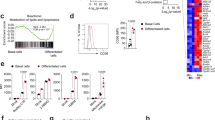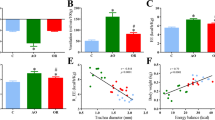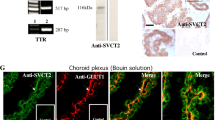Abstract
DEFICIENCY of vitamin A causes a well-defined lesion, namely keratinised squamous metaplasia, in tracheobronchial epithelium1. In this lesion, the normal columnar ciliated and mucus cells of the epithelium, which depend on vitamin A for their formation, are totally replaced by squamous cells which produce keratin. The mechanism of action of vitamin A in controlling this normal differentiation of ciliated and mucus cells is still unknown. We report here an in vitro system for studying this process, using organ culture of hamster tracheas in a chemically defined, serum-free medium. Growth of tracheas in this medium without vitamin A causes keratinised squamous lesions. Addition of vitamin A to the organ cultures after development of such lesions causes reversal of the process of keratinisation and replacement of the squamous cells by columnar ciliated and mucus cells.
This is a preview of subscription content, access via your institution
Access options
Subscribe to this journal
Receive 51 print issues and online access
$199.00 per year
only $3.90 per issue
Buy this article
- Purchase on Springer Link
- Instant access to full article PDF
Prices may be subject to local taxes which are calculated during checkout
Similar content being viewed by others
References
Wolbach, S., and Howe, P., J. exp. Med., 42, 753–769 (1925).
Lasnitzki, I., Expl Cell Res., 28, 40–51 (1962).
Aydelotte, M. B., J. Embryol. exp. Morph., 11, 279–291 (1963).
Ames, S. R., Swanson, W. J., and Harris, P. L., J. Am. Chem. Soc., 77, 4136–4138 (1955).
Pitt, G. A., Am. J. clin. Nutr., 22, 1045–1046 (1969).
Harris, C. C., Sporn, M. B., Kaufman, D. G., Smith, J. M., Jackson, F. E., and Saffiotti, U., J. natn. Cancer Inst., 48, 743–761 (1972).
Parker, R. C., Castor, L. N., and McCulloch, E. A., Spec. Publ. N. Y. Acad. Sci., 5, 303–313 (1957).
Riddiford, L. M., Ajami, A. M., Corey, E. J., Yamamoto, H., and Anderson, J. E., J. Am. Chem. Soc., 93, 1815–1816 (1971).
Slade, M., and Wilkinson, C. F., Science, 181, 672–674 (1973).
Goodman, D. S., Smith, J. E., Hembry, R. M., and Dingle, J. T., J. Lipid Res. (in the press).
Lasnitzki, I., Br. J. Cancer, 9, 434–441 (1955).
Crocker, T. T., and Sanders, L. L., Cancer Res., 30, 1312–1318 (1970).
Hill, D. L., and Shih, T., Cancer Res., 34, 564–570 (1975).
Auerbach, O., Stout, A. P., Hammond, E. C., and Garfinkel, L., New Engl. J. Med., 265, 253–267 (1961).
Author information
Authors and Affiliations
Rights and permissions
About this article
Cite this article
CLAMON, G., SPORN, M., SMITH, J. et al. α and β-Retinyl acetate reverse metaplasias of vitamin A deficiency in hamster trachea in organ culture. Nature 250, 64–66 (1974). https://doi.org/10.1038/250064a0
Received:
Revised:
Published:
Issue Date:
DOI: https://doi.org/10.1038/250064a0
This article is cited by
-
Squamous cell metaplasia in the human lung: molecular characteristics of epithelial stratification
Virchows Archiv B Cell Pathology Including Molecular Pathology (1992)
-
Effects of all-trans retinol and cigarette smoke condensate on hamster tracheal epithelium in organ culture
Virchows Archiv B Cell Pathology (1988)
-
Effects of all-trans retinol and cigarette smoke condensate on hamster tracheal epithelium in organ culture
Virchows Archiv B Cell Pathology (1988)
-
Ciliated cells in vitamin A-deprived cultured hamster tracheal epithelium do divide
In Vitro Cellular & Developmental Biology (1988)
-
Effect of cigarette smoke condensate and vitamin A depletion on keratin expression patterns in cultured hamster tracheal epithelium
Virchows Archiv B Cell Pathology Including Molecular Pathology (1988)
Comments
By submitting a comment you agree to abide by our Terms and Community Guidelines. If you find something abusive or that does not comply with our terms or guidelines please flag it as inappropriate.



